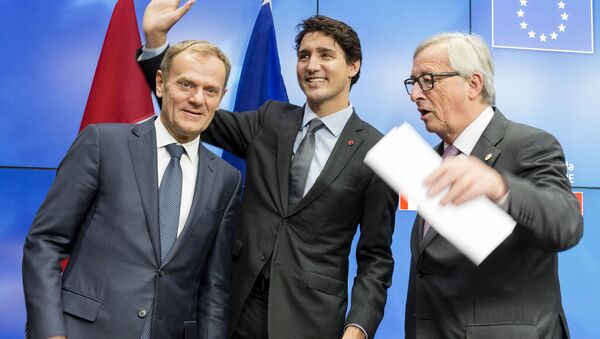The agreement, signed by EU member states and Canada in October, will be debated and voted on by MEPs in Strasbourg.
If the deal is approved, it will be provisionally implemented, with items relating to European law to come into action from March 1. However for the full agreement to come into force, the relevant national and regional parliaments of EU member states and Canada must ratify it.
🇪🇺🇨🇦 🍁#CETA is a new EU-Canada trade deal. It'll end customs tariffs on EU exports like cars 🚗🛃☑️️ Learn more 👉🏽 https://t.co/uNoPR5dFzu pic.twitter.com/3NEVvpuYKC
— EU Trade 🇪🇺 (@Trade_EU) February 14, 2017
If approved, CETA is expected to slash 98 percent of tariffs between the two markets, with proponents saying the deal will boost economic activity across the Atlantic and create investment opportunities for European business.
Concerns Over 'Corporate Court'
Despite the support from governments and business figures, critics have strongly rejected the deal, arguing that CETA could wash away the rights of workers in Europe, introduce weaker environmental standards and lead to job losses across the continent.
Good morning from the EU Parliament, we are delivering messages from 3.5 million citizens who say no to #CETA! #stopCETA More to follow soon pic.twitter.com/vnLEjpHP6Z
— Stop TTIP (@eci_ttip) February 14, 2017
Another major concern is the inclusion of the investor state dispute settlement (ISDS) mechanism, which opens the door for foreign corporations to sue European governments if they introduce policies that may harm investment, leading to claims that CETA will result in a surrendering of sovereignty to overseas investors.
Theses fears have resulted in widespread demonstrations against CETA, while 3.5 million people have signed a petition calling for the deal to be scrapped.
It's #ValentinesDay & Labour MEPs are deciding how to vote on CETA. Send them a card to tell them to #StopCETA https://t.co/UMqM6eR3ok pic.twitter.com/LuCybTvk0R
— Global Justice Now (@GlobalJusticeUK) February 14, 2017
Guy Taylor, trade campaigner for Global Justice Now, said any rejection of CETA would be a "remarkable" development.
"It would be quite a precedent. It hasn't really been done by parliament before — a rejection of such a deal. It would show that the European parliament is democratic and it would show that MEPs have their own mind over these matters and are not just listening to the European Commission," Taylor told Sputnik from Strasbourg.
Irish trade unions oppose #CETA, they know its a bad deal for Irish jobs: https://t.co/lqQy4GyW2a Ask @MaireadMcGMEP to Vote No! #StopCETA pic.twitter.com/G5ngDQfUKY
— Comhlámh (@Comhlamh) February 14, 2017
"It would be quite remarkable, but then again it would show some solid democracy going on in Brussels and Strasbourg."
'We'll Have to See What Happens'
Despite the opposition, EU member states signed off on the deal in October, while the European Parliament's Trade Committee also backed the agreement last month, leading campaigners to believe the deal will be approved by MEPs.
We say yes to trade with Canada & yes to an open world, but can't say yes to #CETA.
— Greens in the EP (@GreensEP) February 14, 2017
Our letter to @JustinTrudeau https://t.co/Xehrt3B3IC pic.twitter.com/rN6xMvK9Ej
"I think it's more likely that they will vote it through, although we have heard today that the British Labour MEPs have got a free vote, so they're not tied to vote for it as we feared they might be. So there's a chance that they might reject it, but we think it's more likely that they will accept it," Taylor said.
Tomorrow #CETA will be voted at the European Parliament. We need to #StopCETA to protect water https://t.co/Ya9oqMdk6i #MakeLoveNotCETA pic.twitter.com/9x6LA5cfXf
— Food & Water Europe (@FoodWaterEurope) February 14, 2017
However, while many believe CETA will pass through the European Parliament, Taylor told Sputnik he expects the deal to experience a "tricky journey" as member states try to ratify it through their national and regional parliaments.
"We'll have to see what happens but I think there's every chance one of the major states could reject it and that would be curtains for CETA," he concluded.


